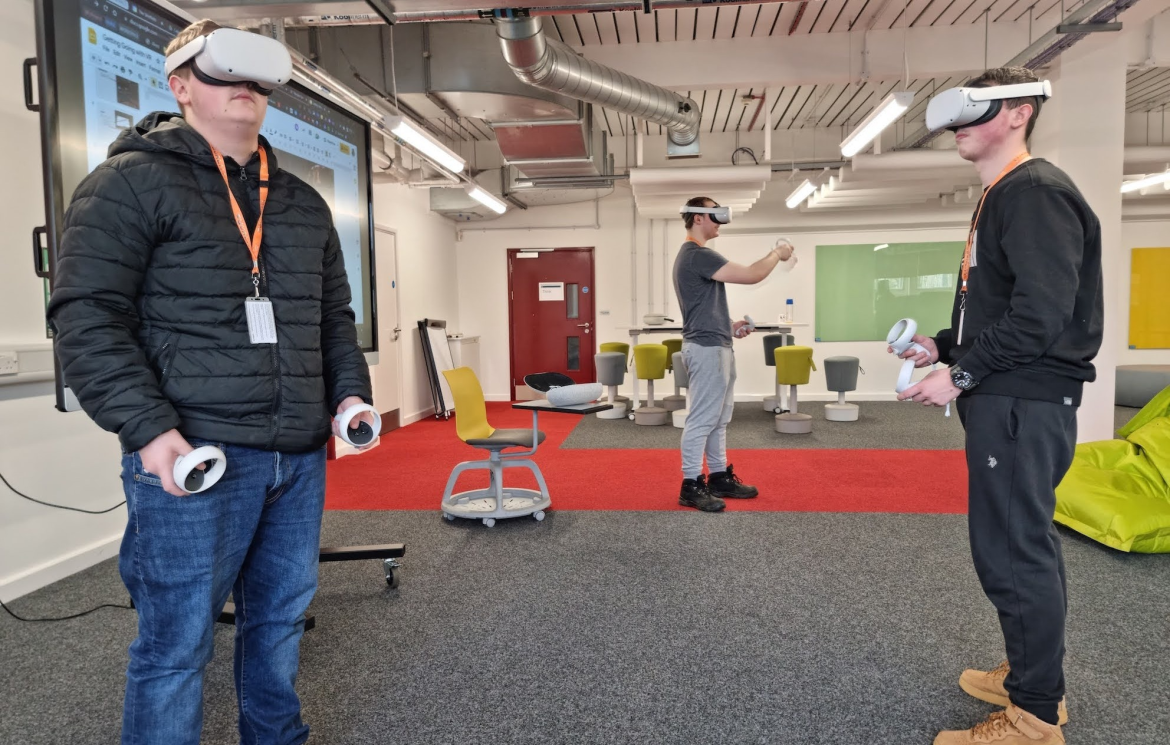
An innovative study by The Sheffield College has found that using virtual reality (VR) in assessments had a positive impact on student performance and in retaining information.
The project – An investigation into the use of virtual reality in assessment – focused on three curriculum areas in catering, animal care, and carpentry and joinery, and asked students to answer questions via a virtual reality headset before then completing a questionnaire 24 hours later.
Results showed that in all three subjects the students averaged over 90% when using the VR headset, with some going on to perform equally well or better in the follow-up assessment – highlighting the impact this method had on knowledge retention.
Supported by the educational charity NCFE’s Assessment Innovation Fund, the pilot also sought student feedback which showed how participants enjoyed using the technology and saw the potential for future use. Staff were also very positive about VR and indicated a willingness to build on their experiences.
The college is the first further education college to receive funding from the NCFE’s Assessment Innovation Fund.
Steven Spence, Assistant Principal for Teaching, Learning, Assessment and Innovation, The Sheffield College, said: “We were delighted to be funded through NCFE’s Assessment Innovation Fund, enabling us to conduct a pilot investigation into the use of virtual reality (VR) on assessment.
“Although the results were positive for the students in the project and will impact on how we at The Sheffield College utilise virtual reality in the future, we really hope that this pilot opens new doors to assessment across the sector, including influencing how awarding bodies design future assessments.”
In total, 41 students took part in the pilot from the three subject areas alongside five staff – including curriculum staff and the Digital and E-Learning Team at the college.
The only concern raised through student feedback was around the comfort of using the headsets, with some staff members feeling they didn’t have enough time to feel confident in using the equipment.
The study outlines five recommendations from the pilot:
- Successful implementation has to be led by a curriculum teacher/team who have reflected on their curriculum content.
- The support from digital specialists is of paramount importance.
- Inductions and training for both staff and students is vital for success.
- From a technical perspective, any institution should make sure they have the desired set up, including networks, software and hardware, to implement VR effectively.
- An institution should utilise students when researching the best VR kit in terms of comfort and adaptability.
The project has been supported by a grant from NCFE’s Assessment Innovation Fund - helping organisations with new approaches to assessment and exploring innovative uses of technology across a range of pilots developed by, but not limited to, training providers, qualification developers, awarding bodies, quality assurers, EdTech companies, and colleges.
Dean Blewitt, Innovation Project Manager at NCFE, said: "The Sheffield College's innovative use of VR in assessments, as highlighted in this study, has delivered impressive results in terms of student performance and knowledge retention.
“This research underscores the transformative potential of VR technology in education. We are proud to have supported this initiative through NCFE's Assessment Innovation Fund, as it aligns perfectly with our mission to advance innovative approaches to assessment and the effective utilisation of technology in learning."
The fund has also enabled further applications of the VR technology outside the scope of the pilot and the positive results mean the technology has been embraced more widely by other areas of the college.
The headsets will remain for future cohorts of students and more curriculum areas have now secured internal funding to create their own VR environments and experiences.
To find out more about the project, including a YouTube interview with Steve Spence, please visit the NCFE’s website.

